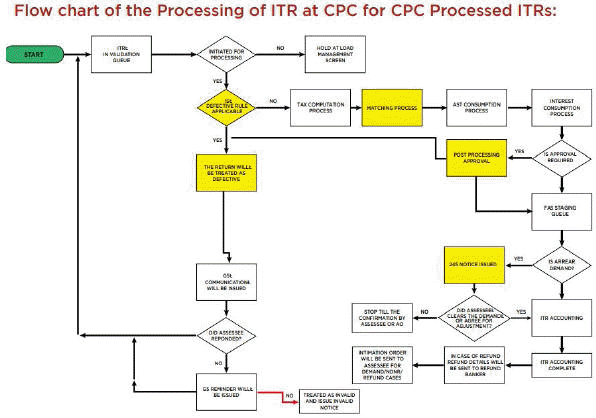[Opinion] Genesis of Intimation u/s 143(1)(a) of the Income Tax Act
- Blog|News|Income Tax|
- 2 Min Read
- By Taxmann
- |
- Last Updated on 12 September, 2024

P. VENKATESAN – [2024] 166 taxmann.com 270 (Article)
1. When we upload our income tax return on the e-filing portal, the Centralized Processing Centre (CPC) captures and begins processing it through an automated system. The CPC checks for any defects in the return and, if any are found, issues a notice to the taxpayer to correct these issues within 15 days. After this period, the CPC proceeds with processing the return. In most cases, the return is accepted without any further action, and refunds are issued if applicable. However, if there are deficiencies such as incorrect claims, the CPC will make the necessary adjustments and raise a demand after providing necessary opportunity to the tax payers. For sake of reference the flow chart of processing of return of income by CPC is given below:

2. To understand the evolution of this process of return, let’s look back at the earlier framework. According to Section 23(1) of the Indian Income Tax Act, 1922, if the Income-tax Officer was satisfied that a return filed under Section 22 was correct and complete without requiring the presence of the assessee or any evidence, the total income would be assessed based on the return.
3. Over time, the Income Tax Act of 1961 replaced the earlier Act. With the amendment Act 42 of 1970, Section 143(1)(a) was introduced w.e.f 1.4.1971, allowing the Income Tax Officer to make prima facie adjustments for incorrect claims and to allow claims that were not initially made by the taxpayer in the return.
4. The Direct Tax Laws (Amendment) Act 1987 w.e.f 1.4.1989 introduced significant amendments to Section 143(1)(a), allowing the Assessing Officer to make various adjustments during the summary assessment of income tax returns. If the return indicates any tax or interest due, this amount will be quantified, and an intimation will be issued to the taxpayer, which is considered a demand notice under Section 156 of the Income Tax Act. Similarly, if a refund is due, it will be issued to the taxpayer. The Assessing Officer was also empowered to make the following adjustments under Section 143(1)(a):-
(i) any arithmetical errors in the return, accounts or documents accompanying it shall be rectified;
(ii) any loss carried forward, deduction, allowance or relief, which, on the basis of the information available in such return, accounts or documents, is prima facie admissible but which is not claimed in the return, shall be allowed;
(iii) any loss carried forward, deduction, allowance or relief claimed in the return, which, on the basis of the information available in such return, accounts or documents, is prima facie inadmissible, shall be dis-allowed:
If these adjustments result in an increase in income or a reduction of declared losses, the Assessing Officer could levy an additional tax at a rate of 20% on such adjustments.
Click Here To Read The Full Article
Disclaimer: The content/information published on the website is only for general information of the user and shall not be construed as legal advice. While the Taxmann has exercised reasonable efforts to ensure the veracity of information/content published, Taxmann shall be under no liability in any manner whatsoever for incorrect information, if any.

Taxmann Publications has a dedicated in-house Research & Editorial Team. This team consists of a team of Chartered Accountants, Company Secretaries, and Lawyers. This team works under the guidance and supervision of editor-in-chief Mr Rakesh Bhargava.
The Research and Editorial Team is responsible for developing reliable and accurate content for the readers. The team follows the six-sigma approach to achieve the benchmark of zero error in its publications and research platforms. The team ensures that the following publication guidelines are thoroughly followed while developing the content:
- The statutory material is obtained only from the authorized and reliable sources
- All the latest developments in the judicial and legislative fields are covered
- Prepare the analytical write-ups on current, controversial, and important issues to help the readers to understand the concept and its implications
- Every content published by Taxmann is complete, accurate and lucid
- All evidence-based statements are supported with proper reference to Section, Circular No., Notification No. or citations
- The golden rules of grammar, style and consistency are thoroughly followed
- Font and size that’s easy to read and remain consistent across all imprint and digital publications are applied



 CA | CS | CMA
CA | CS | CMA
